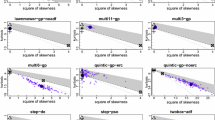Abstract
This paper presents a new mathematical approach to study the behaviour of population-based methods. The calculation of the takeover time and the dynamical growth curves is a common analytical approach to measure the selection pressure of an EA and any algorithm which manipulates a set of solutions. In this work, we propose a new and more accurate model to calculate these values. This new model also includes other very interesting features, such as the characterization of the complete behaviour of the methods using a single value, the Rayleigh distribution parameter. We also extend the study to consider the effect of the mutation (or in general, any neighborhood exploration operator) and we show several advanced uses of this models such as building self-adaptive techniques or comparing algorithms.
Access this chapter
Tax calculation will be finalised at checkout
Purchases are for personal use only
Preview
Unable to display preview. Download preview PDF.
Similar content being viewed by others
References
Goldberg, D.E., Deb, K.: A Comparative Analysis of Selection Schemes Used in Genetic Algorithms. In: Rawlins, G.J. (ed.) Foundations of Genetic Algorithms, pp. 69–93. Morgan Kaufmann, San Mateo (1991)
Sarma, J., De Jong, K.: An Analysis of Local Selection Algorithms in a Spatially Structured Evolutionary Algorithm. In: Bäck, T. (ed.) Proceedings of the 7th International Conference on Genetic Algorithms, pp. 181–186. Morgan Kaufmann, San Francisco (1997)
Alba, E., Luque, G.: Theoretical Models of Selection Pressure for dEAs: Topology Influence. In: Corne, D., et al. (eds.) 2005 IEEE Congress on Evolutionary Computation (CEC 2005), Edinburgh, UK, pp. 214–222 (2005)
Sprave, J.: A Unified Model of Non-Panmictic Population Structures in Evolutionary Algorithms. In: Angeline, P.J., Michalewicz, Z., Schoenauer, M., Yao, X., Zalzala, A. (eds.) Proceedings of the Congress of Evolutionary Computation, Mayflower Hotel, Washington D.C., USA, vol. 2, pp. 1384–1391. IEEE Press (July 1999)
Chakraborty, U.K., Deb, K., Chakraborty, M.: Analysis of Selection Algorithms: A Markov Chain Approach. Evolutionary Computation 4(2), 133–167 (1997)
Gorges-Schleuter, M.: An Analysis of Local Selection in Evolution Strategies. In: Banzhaf, W., Daida, J., Eiben, A.E., Garzon, M.H., Honavar, V., Jakiela, M., Smith, R.E. (eds.) Proceedings of the Genetic and Evolutionary Computation Conference, Orlando, Florida, USA, vol. 1, pp. 847–854. Morgan Kaufmann (July 1999)
Rudolph, G.: Takeover Times in Spatially Structured Populations: Array and Ring. In: Lai, K.K., Katai, O., Gen, M., Lin, B. (eds.) 2nd Asia-Pacific Conference on Genetic Algorithms and Applications, pp. 144–151. Global-Link Publishing (2000)
Cantú-Paz, E.: Migration, Selection Pressure, and Superlinear Speedups. In: Efficient and Accurate Parallel Genetic Algorithms, pp. 97–120. Kluwer (2000)
Giacobini, M., Tomassini, M., Tettamanzi, A.G.B.: Modeling Selection Intensity for Linear Cellular Evolutionary Algorithms. In: Liardet, P., Collet, P., Fonlupt, C., Lutton, E., Schoenauer, M. (eds.) EA 2003. LNCS, vol. 2936, pp. 345–356. Springer, Heidelberg (2004)
Forbes, C., Evans, M., Hastings, N., Peacock, B.: Rayleigh Distribution. In: Statistical Distributions. John Wiley & Son (2010)
Osorio, K., Luque, G., Alba, E.: Distributed Evolutionary Algorithms with Adaptive Migration Period. In: 2011 11th International Conference on Intelligent Systems Design and Applications (ISDA), pp. 259–264 (November 2011)
Author information
Authors and Affiliations
Editor information
Editors and Affiliations
Rights and permissions
Copyright information
© 2012 Springer-Verlag Berlin Heidelberg
About this paper
Cite this paper
Luque, G., Alba, E. (2012). Analyzing the Behaviour of Population-Based Algorithms Using Rayleigh Distribution. In: Coello, C.A.C., Cutello, V., Deb, K., Forrest, S., Nicosia, G., Pavone, M. (eds) Parallel Problem Solving from Nature - PPSN XII. PPSN 2012. Lecture Notes in Computer Science, vol 7491. Springer, Berlin, Heidelberg. https://doi.org/10.1007/978-3-642-32937-1_42
Download citation
DOI: https://doi.org/10.1007/978-3-642-32937-1_42
Publisher Name: Springer, Berlin, Heidelberg
Print ISBN: 978-3-642-32936-4
Online ISBN: 978-3-642-32937-1
eBook Packages: Computer ScienceComputer Science (R0)




